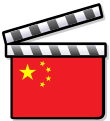
The Bank of China Tower is a skyscraper located in Central, Hong Kong. Located at 1 Garden Road on Hong Kong Island, the tower houses the headquarters of the Bank of China Limited. One of the most recognisable landmarks in Hong Kong, the building is notable for its distinct shape and design, consisting of triangular frameworks covered by glass curtain walls.
English usually refers to:
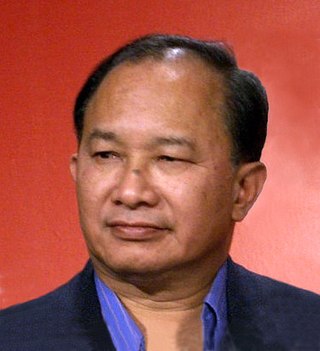
John Woo Yu-sen is a Hong Kong film director known as a highly influential figure in the action film genre. He is a pioneer of heroic bloodshed films and the gun fu genre in Hong Kong action cinema, before working in Hollywood films. He is known for his highly chaotic "bullet ballet" action sequences, stylized imagery, Mexican standoffs, frequent use of slow motion and allusions to wuxia, film noir and Western cinema.

Martial arts films are a subgenre of action films that feature martial arts combat between characters. These combats are usually the films' primary appeal and entertainment value, and often are a method of storytelling and character expression and development. Martial arts are frequently featured in training scenes and other sequences in addition to fights. Martial arts films commonly include hand-to-hand combat along with other types of action, such as stuntwork, chases, and gunfights. Sub-genres of martial arts films include kung fu films, wuxia, karate films, and martial arts action comedy films, while related genres include gun fu, jidaigeki and samurai films.
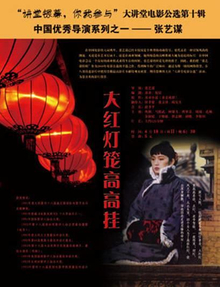
Raise the Red Lantern is a 1991 Chinese period drama film directed by Zhang Yimou and starring Gong Li. It is an adaptation by Ni Zhen of the 1990 novella Raise the Red Lantern by Su Tong. The film was later adapted into an acclaimed ballet of the same title by the National Ballet of China, also directed by Zhang. Set during the Warlord Era in the 1920s, the film tells the story of a young woman who becomes the fourth wife of a wealthy man. It was the third of eight collaborations between Zhang and Gong, following Red Sorghum in 1987 and Ju Dou in 1990. The film was shot in the Qiao Family Compound near the ancient city of Pingyao, in Shanxi Province.

Tsui Hark, born Tsui Man-kong, is a Hong Kong filmmaker. Tsui has directed several influential Hong Kong films such as Zu Warriors from the Magic Mountain (1983), the Once Upon a Time in China film series (1991–1997) and The Blade (1995). Tsui also has been a prolific writer and producer; his productions include A Better Tomorrow (1986), A Better Tomorrow II (1987), A Chinese Ghost Story (1987), The Killer (1989), The Legend of the Swordsman (1992), The Wicked City (1992), Iron Monkey (1993) and Black Mask (1996). He is viewed as a major figure in the Golden Age of Hong Kong cinema and is regarded by critics as "one of the masters of Asian cinematography".

Gong Li is a Chinese actress. Regarded as one of the best actresses in China today, she is known for her versatility and naturalistic performance. She starred in three of the four Chinese-language films that have been nominated for the Academy Award for Best International Feature Film.
The year 1992 in film involved many significant film releases.

Joan Chen is a Chinese-American actress and film director. In China, she starred in the 1979 film Little Flower and came to the attention of American audiences for her performance in the 1987 film The Last Emperor, which won nine Academy Awards including Best Picture. She is also known for her roles in Twin Peaks, Red Rose White Rose, Saving Face and The Home Song Stories, and for directing the feature film Xiu Xiu: The Sent Down Girl.
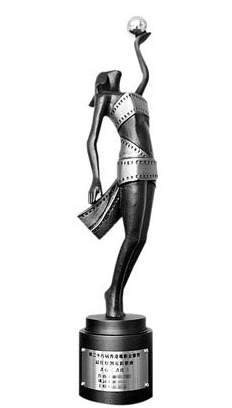
The Hong Kong Film Awards, founded in 1982, is an annual film awards ceremony in Hong Kong. The ceremonies typically take place in April, and have mostly been held at the Grand Theatre of the Hong Kong Cultural Centre since 1991. The awards recognise achievement in various aspects of filmmaking, such as directing, screenwriting, acting and cinematography. The awards are regarded as the Hong Kong equivalent of the Academy Awards.
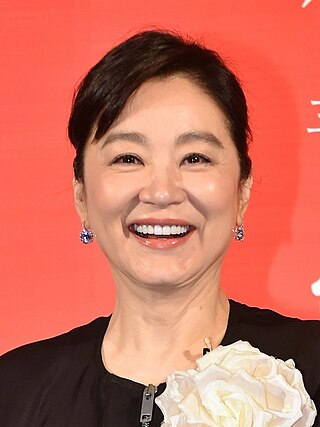
Brigitte Lin Ching-hsia is a Taiwanese actress. She is regarded as an icon of Chinese language cinema for her extensive and varied roles in both Taiwanese and Hong Kong films.
This is an index for the list of films produced in mainland China ordered by decade on separate pages. For an alphabetical listing of Chinese films see Category:Chinese films
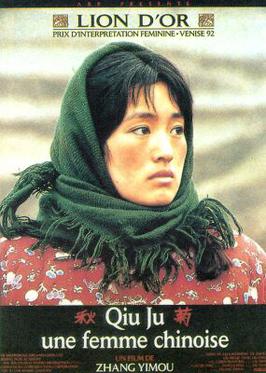
The Story of Qiu Ju is a 1992 Chinese comedy-drama film. The film was directed by Zhang Yimou and, as in many of his films, stars Gong Li in the title role. The screenplay is an adaption of Chen Yuanbin's (陈源斌) novella The Wan Family's Lawsuit (万家诉讼).
The Changchun Film Festival (中国长春电影节) is a biennial international film festival held in the Chinese city of Changchun. Ostensibly international, its award for best film, the Golden Deer has nevertheless primarily been awarded to Chinese and other East Asia-region films. It was first held in 1992 and was founded in part by the Changchun Film Studio.

The Hundred Flowers Awards are, together with the Golden Rooster Awards, the most prestigious film awards honouring the best in Chinese cinema, as well as Hong Kong cinema and the Cinema of Taiwan, they are classified as the Chinese equivalent of the United States Golden Globes.
2017 in film is an overview of events, including the highest-grossing films, award ceremonies, festivals, a list of films released, and notable deaths.
2018 in film is an overview of events, including the highest-grossing films, award ceremonies, critics' lists of the best films of 2018, festivals, a list of films released, and notable deaths.
